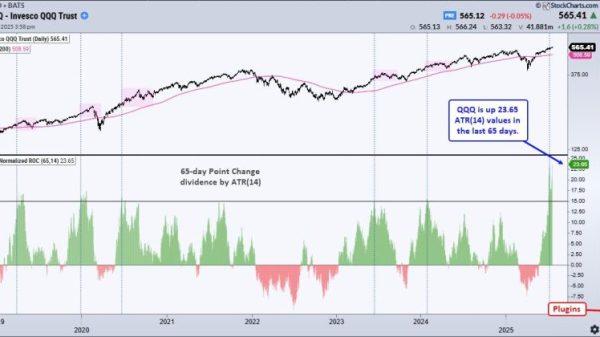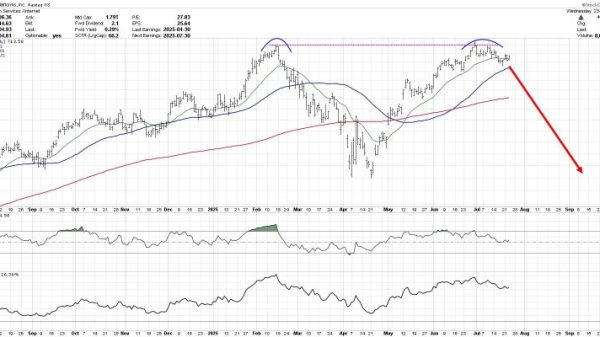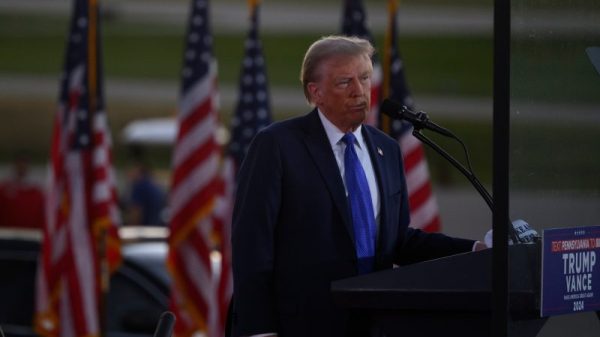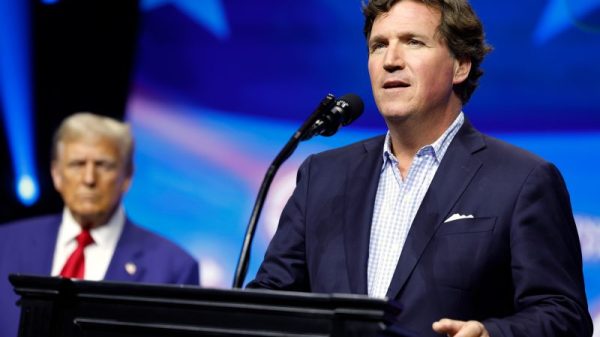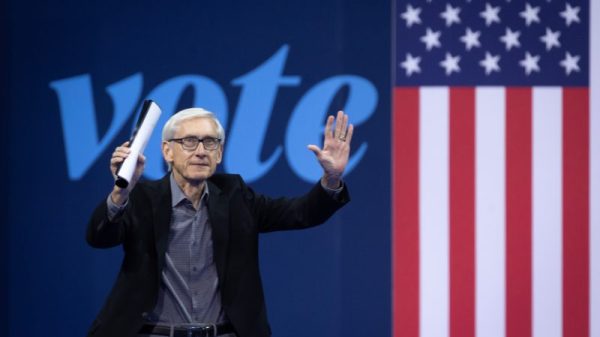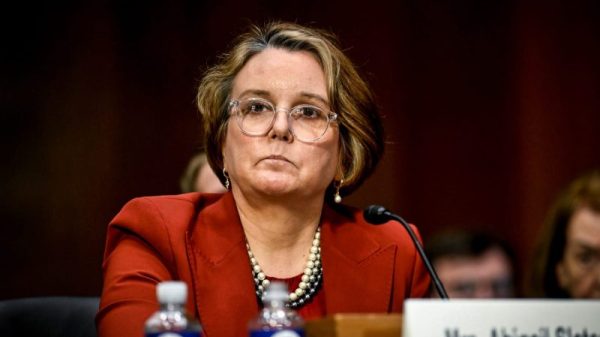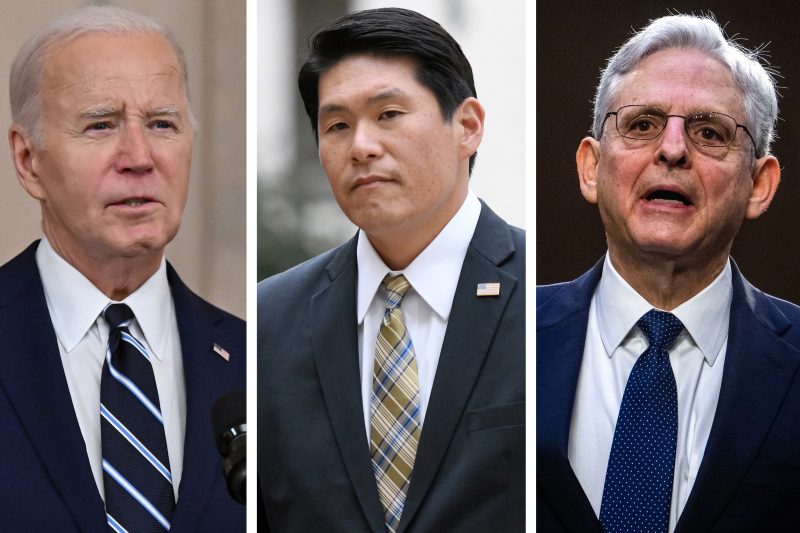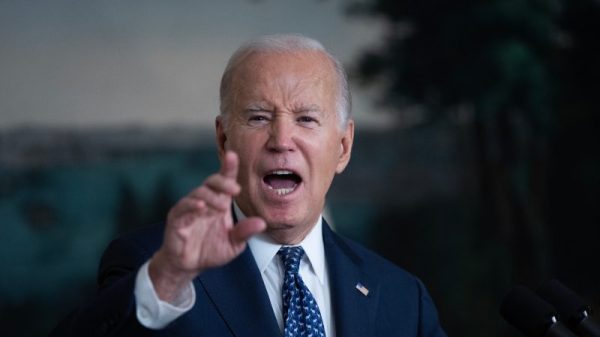When prosecutor Robert Hur testifies to Congress on Tuesday about his investigation of President Biden’s handling of classified documents, he is expected to defend a special counsel process created to shield fraught cases from political interference.
But Hur’s testimony will also highlight how Attorney General Merrick Garland’s use of special counsels to handle the most politically sensitive cases has calcified tensions between the White House and the Justice Department.
It will be the first time Hur addresses the public since his report last month on why he would not seek to charge Biden for his alleged mishandling of classified documents after his vice presidency — including that a jury might see Biden as “a sympathetic, well-meaning, elderly man with a poor memory,” not a criminal trying to break the law.
Biden and his top aides exploded at that portrait of the 81-year-old president, whose age and cognitive abilities have become a crucial issue in the 2024 presidential race. The report fueled White House anger at Garland, who Biden aides say has over-relied on special counsels — including to investigate the president’s son, Hunter — in a way they believe has insulated the attorney general from some of the Justice Department’s toughest decisions.
To many, Garland has been dealt an improbable hand: Unprecedented Justice Department investigations into Biden and former president Donald Trump as they prepare to face off in the 2024 election. The separate probe of Hunter Biden, whose legal troubles stem from years of drug addiction. A mandate to insulate the Justice Department from politics at a time when Trump and his allies repeatedly, and without evidence, claim the investigations of his actions are politically motivated.
In all these cases, the Justice Department says that following protocol and requests by prosecutors, Garland had no choice but to appoint special counsels.
White House officials and Biden allies, speaking on the condition of anonymity to discuss a sensitive issue, see it differently. They accuse Garland of allowing prosecutor David Weiss’s investigation of Hunter Biden’s business dealings to drag on for years, only to result in a plea deal that embarrassingly collapsed in public and led to Weiss’s appointment as a special counsel. Two indictments quickly followed — on gun and tax charges — that Biden allies say would not be levied against most Americans in similar circumstances.
And White House officials and Biden’s allies say the Hur report contained gratuitous and inappropriate swipes at the president’s age and memory — political kryptonite for congressional oversight committees and voters in an election year. Some wanted Garland to question those references when he reviewed the report, according to people familiar with the White House conversations, even though doing so would have meant notifying Congress that he had asked Hur for edits.
Current and some former Justice Department officials have defended the inclusion of the memory details — many of them also speaking on the condition of anonymity to discuss a sensitive matter. They said that when Hur concluded Biden had willfully retained classified materials but declined to charge him, he had to explain his reasoning.
In that way, the special counsel report served as what is known in standard criminal investigations as a declination memo, these people said. Such memos often contain far more damaging details about the reliability of witnesses and the subjects of investigations than Hur’s report did, Justice Department officials said. But those memos are not made public — in keeping with Justice Department guidance that prosecutors should be sensitive to the reputations of people they are not charging.
Spokespeople for the White House and the Justice Department declined to discuss the relationship between the president and the attorney general.
But multiple current and former Justice officials said the department is resolute that Garland has acted apolitically and strictly adhered to agency norms during his tenure. And yet the White House remains furious, people there said, revealing a schism over how the two entities believe the federal law enforcement should function in polarized times.
“It’s the only agency, it’s the only cabinet position which has an inherent conflict of interest,” said Robert Raben, who worked as an assistant attorney general in the Clinton administration. “That is by design. It is the only cabinet secretary at a cabinet meeting who has the dual role of protecting us but possibly investigating us. Everything about the relationship between presidents and White House counsel and the leadership of the Department of Justice can be explained by that tension.”
The investigation into Biden’s handling of classified material started in late 2022 after aides discovered documents from his time as vice president at a think tank Biden started in 2017. The aides handed the material to the National Archives and Records Administration, which is responsible for storing and preserving presidential records, and an Archives official notified the Justice Department.
Soon after, Garland assigned John Lausch, the U.S. attorney in Chicago and a Trump administration holdover, to conduct an initial investigation. After Biden’s lawyers notified Lausch of two more discoveries of documents marked classified at the president’s Wilmington, Del., home, Lausch told Garland a special counsel was warranted.
On Jan. 12, 2023, Garland appointed Hur, a Republican who during the Trump administration served as U.S. attorney in Maryland and as a senior Justice Department official. At the time, Republicans and Democrats said Hur was a well-respected attorney and the right man to take over the investigation.
He built a team of lawyers that included both Democrats and Republicans, according to multiple people familiar with the staffing, who spoke on the condition of anonymity to discuss it. Hur’s deputy was Marc Krickbaum, U.S. attorney for the Southern District of Iowa when Trump was in the White House. Hur also tapped two lawyers who had worked with him in the Maryland U.S. attorney’s office: Tom Sullivan and Christina Hoffman.
The appointment of a special counsel is intended to make high-profile, sensitive investigations as independent and apolitical as possible. A special counsel has more independence from Justice Department leaders than other federal prosecutors, but still ultimately answers to the attorney general.
When appointing Hur, Garland cited “extraordinary circumstances,” noting that Biden at the time was expected to run for reelection — and had appointed Garland to his job. A few months earlier, Garland had similarly cited the 2024 race when appointing special counsel Jack Smith to take over two federal investigations of Trump — one focused on his retention of classified documents after leaving the White House, the other on his efforts to block Biden’s 2020 election victory.
Hur and his team provided updates on the Biden probe about once a week to a liaison at Justice Department headquarters. That person would relay any necessary information to Garland, according to two officials familiar with the communication.
In addition to broad updates to the Justice Department, special counsels are required to flag any significant, public-facing potential investigative steps, such as convening a grand jury, executing a search warrant or interviewing the president. The attorney general is not supposed to interfere on incremental steps even if they believe the special counsel should be taking a different approach, according to multiple current and former Justice Department officials familiar with the process. But they said the attorney general should intervene if the investigation is running afoul of Justice Department regulations.
Garland met with Hur at least once during the investigation, according to people familiar with the meeting, and he has also met with special counsels Smith and Weiss.
When Hur finished his 345-report, he first sent it to Biden’s lawyers to review in person. The Biden team was permitted to request factual edits and to submit a response that was included in the final copy.
They asked Hur to consider removing the details about the president’s memory, but Hur refused, according to two people familiar with the communications.
Hur then sent a final copy to the Justice Department for review by Bradley Weinsheimer, the agency’s highest ranking career staffer — meaning he is not a political appointee.
Weinsheimer had received a letter from Biden’s lawyers saying Hur’s report “blatantly violates Justice Department policy and practice.” He read the report and determined that the document was appropriate and contained nothing that violated agency regulations, according to officials familiar with the internal conversations.
Garland reviewed what Hur’s team had written and agreed. He prepared to submit the report to Congress and then make it public with no redactions.
Hours after the report was made public, Biden did a rare, late-night news conference, defending himself and condemning Hur’s assessment of his memory.
But, within the White House, aides find themselves in an awkward position. They are divided about how far to go in slamming the attorney general that Biden picked — or his Justice Department, which is supposed to remain independent when it comes to prosecutorial decisions and also is tasked with carrying out Biden policy initiatives on guns, drugs and criminal justice.
For years, Democrats have railed against Trump for attempting to intervene and politicize federal law enforcement decisions, arguing that he has undermined the impartial system of justice in the country by attacking judges and prosecutors. They do not want to be accused of similar conduct.
Anthony Coley, a former Garland spokesman, argued that Democrats should focus their ire on Hur, and will only hurt their own political future by complaining about a Biden appointee like Garland. “It is undermining the president’s reelection,” said Coley, who has previously criticized the references to Biden’s memory in the special counsel report. “The criticism should start with Robert Hur.”
Federal policy says that, outside rare circumstances, White House personnel should not talk to Justice Department officials about pending investigations or cases. Both White House and Justice Department officials say that Garland and Biden have never broken that policy, and have never discussed the Hur investigation or other special counsel probes.
Still, Biden allies argue Garland could have selected a range of other qualified individuals for this special counsel role, including those who served in other Republican administrations, not Trump’s. They also complain that Hur took far too long to complete the investigation and the report, dragging it into the middle of a presidential election year.
Garland’s allies dismiss the White House criticism as ridiculous. They said Hur had to explain why he thought charges shouldn’t be brought — even if one of the reasons was that a jury would find Biden sympathetic and forgetful and therefore not convict him.
When questioned before Congress, Hur will almost certainly be asked about any changes or edits requested by Garland, potentially creating a political nightmare for both Garland and Biden, Justice Department officials said. Hur’s assessment of the president’s memory, they argue, likely would have come out anyway.
Much of the tension between the White House and the Justice Department flows from the public release of Hur’s report, which drew widespread news coverage and provided fodder for devastating campaign ads about the incumbent president. Despite the frustration, Justice Department and White House aides have continued to meet on national security and foreign policy issues, according to multiple people familiar with those sessions.
The rules governing special counsel appointments do not require that their reports be made available to Congress and the public. But most recent special counsel reports have been made public, and Garland had vowed to release Hur’s as well.
During Biden’s presidential transition, aides were divided over whom to nominate for attorney general. Ron Klain, who at the time was Biden’s incoming chief of staff, strongly advocated for Garland, positing that the former federal judge and onetime Supreme Court nominee was the best choice to restore independence to the department after the Trump administration.
Other Biden allies, however, strongly pushed for former U.S. senator Doug Jones, believing that the Alabama Democrat also had unimpeachable credentials but would better understand the politics of the moment.
In the early months of Biden’s presidency, the president and others complained in private conversations that Garland was moving too slowly to prosecute Trump for his role in the Jan. 6, 2021, attack on the U.S. Capitol, according to multiple people familiar with those discussions. And while Biden has never criticized Garland publicly, he has expressed frustration about him behind the scenes, these people said.
In Garland — who was selected before the attack on the Capitol, with news of his nomination breaking the morning of Jan. 6 — some argue the White House got what it wanted: An attorney general who would restore norms after the Trump era and do everything possible to stay out of politics.
Yet Garland’s hands-off approach to some of the most sensitive investigations, Biden allies say, is a political decision that has far-reaching consequences.
Even people who disagree with Garland’s choices say he is doing exactly what he pledged when taking on the role. He vowed to depoliticize the agency and to never be the person who would make a splashy political statement.
Multiple people interviewed for this article said that Garland did not have a choice but to appoint a special counsel for the Biden classified documents probe once Biden announced he was running for reelection. And they note that Garland would have been required to tell Congress if he sought changes or redactions after reviewing the report.
Mary McCord, who served as acting assistant attorney general for national security during President Barack Obama’s administration, said she disagreed with Hur including an assessment of Biden’s memory in the report.
But she said that there was not much Garland could do about it.
“He was put in between a rock and a hard place when the report came through with that language in it,” McCord said. “If he did not make it public, he would have been absolutely and vociferously criticized for redacting it or not making it public.”

